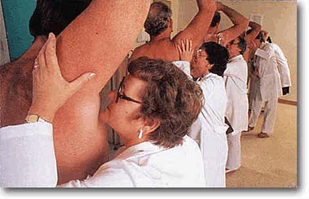
Identifying People By Odor As Effective As Fingerprinting 157
A study has found that everybody has a unique body odor, like their fingerprints, that could be used as an unique identifier. The study showed that a persons unique odor stayed the same even if they varied their diet with strong smelling foods such as garlic and spices. "These findings indicate that biologically-based odorprints, like fingerprints, could be a reliable way to identify individuals," said Monell chemist Jae Kwak. I would have thought that hundreds of years of dogs tracking people would have proved this, but it's nice to know that science has figured it out officially now.

Re:finger prints arent that unique! (Score:5, Informative)
the idea that fingerprints are unique is stupid, especially for anyone who is actually in law enforcement or forensics. you need 12 count it TWELVE different points of matching to even get a fingerprint submitted for evidence. so if this odor is just as effective that means its pretty much a scare tactic as much as "we got your fingerprints at the scene!" is
I wouldn't call it stupid, just incorrect when all possibilities are tried.
Aside from genetically-identical twins, there are a rare few known cases where people do have matching fingerprints (it's been awhile since I read the article but I seem to recall a resolution of around a thousand comparison points in one such case). However, with the incredibly low occurrence rate for this duplication, fingerprints still reign as the current top method for human identity verification (DNA matching takes alot more time and still isn't 100% accurate).
The article and summary are misleading, as well. This study was only performed on mice, not humans. There is additional doubt introduced from the lack of description of the experimental procedure. If the mice weren't separated long enough after the diet change, then a sufficient amount of the recognized scent may have remained for the other mice to make correct identifications.
The comment about dogs in the summary may be incorrect as well, but I don't really know. I have never read about any studies that tried to have a dog track a person from a previous scent marker after they've undergone a radical diet change and sufficient time for the body to remove the chemical traces of the old diet. They usually give dogs an item that someone has used recently in order to track them by scent.
I do know two things from my personal experiences as a person with a strong sense of smell:
1. In favor of the results that the articles puts forward as 'fact' - without perfumes, colognes, other scented body products or even any noticeable sweat; a woman definitely smells different than a man.
2. Disagreeing with the postulate from the results of the study - How best to put this delicately? The scent of certain subsets of people that stereotypically consume specific diets does indeed match scents from those diets when their scent becomes strong enough.
Of course, I'm not a canine, so regardless of my personal experience, there may indeed be elements of a person's scent that are as unique as their DNA. Actually, if a dog's sense of smell is advanced enough, their olfactory processing could be doing on-the-fly DNA matching. Though, I've never seen someone even postulate a study that could confirm that little bit of information.
I do agree with a couple of the other comments so far. This news has enough merit to be under a section other than Idle.
Not sure about uniquely identifying (Score:3, Informative)
I'm not sure about odor on men (as I'm not interested in men, thank you), but odor on each woman is quite distinctive if you have intimate contact with her. That's only from personal experience (anecdote), and by no means a scientific study.
The five women I have (or had) intimate relationship with, I can distinguish each one of them with my eyes blind-folded. A woman's distinctive smell are usually from the cheek, on the neck, from behind the ear, on the lips, etc. It's definitely distinctive, but can it be used as a unique identifier, I'm not sure.
Thinking about it, each woman having a distinctive oder is quite natural, as this is the same thing as on other animals. After all these years of evolution, humans do not rely on smell anymore to mate or to find a mate, therefore, it has become less important and less obvious. But I think it's still there, if you pay attention to it.
Re:What porn site did that picture come from? (Score:4, Informative)
Re:Obviously... (Score:4, Informative)
I agree.
TRIVIA - Smelling people can also reveal your mate. A quick whiff allows the body to detect a person's genetic makeup, and we feel attracted to those with genes opposite to ours.
The use of deodorants and birth control pills can disrupt this natural process (your mate's smell is masked or changed).
Reliable like fingerprints? (Score:3, Informative)
"These findings indicate that biologically-based odorprints, like fingerprints, could be a reliable way to identify individuals"
Slightly off-topic, but since when do fingerprints qualify as a reliable way to identify a person? They can easily be faked, and once they are, there's no way to revoke them. It's like having a really bad passport...